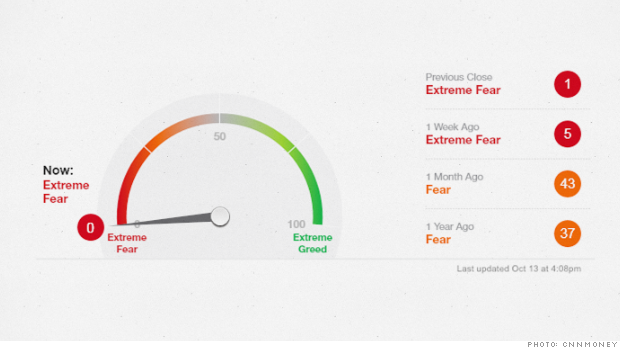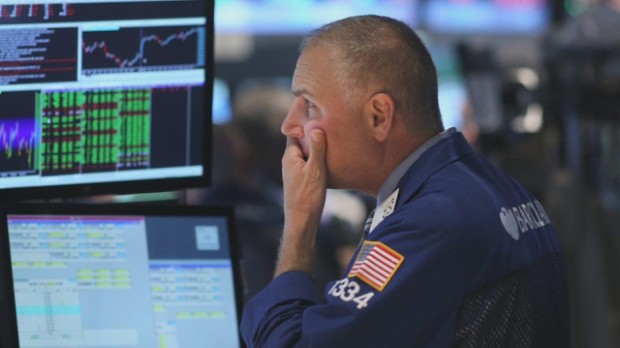Among the companies with shares expected to actively trade in Tuesday’s session are McDonald's Corp.(MCD), Coca-Cola Co.(KO) and Verizon Communications Inc.(VZ)
McDonald’s promised significant changes after reporting a worse-than-forecast 30% drop in third-quarter earnings and calling its challenges “more formidable than expected.” Shares fell 2% to $89.75 in premarket trading.
Coca-Cola unveiled a broader cost-cutting program and warned that it doesn’t expect to meet previous financial targets as the beverage giant again posted lackluster quarterly soda volume and struggled with currency headwinds. Shares dropped 4.6% to $41.29 premarket.
Verizon Communications said it added 1.52 million of its most lucrative long-term wireless contracts in the third quarter, again driven by a surge in tablet connections. But per-share earnings fell below Wall Street estimates. Shares declined 0.9% to $48.05 premarket.
Kimberly-Clark Corp.(KMB) said Tuesday it plans to cut up to 1,300 jobs as part of a restructuring initiative to reduce costs, while also reporting a 2.9% increase in third-quarter earnings. Shares rose 0.9% to $109 premarket.
Lockheed Martin Corp.(LMT) on Tuesday reported a forecast-beating 1.7% rise in third-quarter profit and raised its 2014 earnings outlook for the third time this year, but said sales and margins will drop sequentially in 2015. Shares lost 2.7% to $170.80 premarket.
United Technologies Corp.(UTX) said its sales rose 4.6% in the latest quarter, driven by higher equipment orders at its Otis elevator and other businesses. Shares gained 2.2% to $103.75 premarket.
Lexmark International Inc.(LXK) said its earnings rose 12%, driven by higher hardware and services revenue, and the company boosted the low end of its outlook for the year. Shares jumped 11% to $44 premarket.
Apple Inc.(AAPL) on Monday said its quarterly profit rose 13% as strong demand for its new larger-screen iPhones helped to overcome sluggish iPad sales. Shares were up 2.6% to $102.38 premarket.
Harley-Davidson Inc.(HOG) posted an expected quarterly decline in motorcycle shipments, while profit and revenue also fell. But earnings topped analysts’ expectations, sending shares up 6.4% to $62.10 premarket.
Reynolds American Inc.(RAI) said cigarette volumes slipped again, but revenue and profit grew thanks in part to higher prices.
Travelers Cos. said its operating profit edged up 1.1% in the third quarter, easily topping expectations, amid an unusually quiet U.S. hurricane season so far this year and strong investment earnings.
AbbVie Inc.(ABBV) and Shire (SHPG) PLC officially agreed Monday to terminate their $54 billion deal, killing the year’s biggest agreed-upon merger.
Illinois Tool Works Inc.(ITW) raised its 2014 profit outlook and reported third-quarter earnings rose 17% as most of its business segments posted revenue growth and margins strengthened.
Omnicom Group Inc.(OMC) posted a stronger-than-expected 24% increase in earnings in the third quarter, helped by revenue growth in all markets.
Regions Financial Corp.(RF) reported an 11% increase in profit for the September quarter, but its revenue declined.
Brinker International Inc.(EAT) said its first-quarter profit increased 12%, helped by higher sales at its Chili’s Grill & Bar and Maggiano’s Little Italy chains.
Illumina Inc.(ILMN) on Monday raised its 2014 guidance as third-quarter results topped analysts’ expectations due to strong demand for the gene-sequencing company’s products.
Staples Inc.(SPLS) said late Monday it is investigating a possible card data breach.
Chipotle Mexican Grill Inc.(CMG) warned its sales growth next year may slow from the robust gains reported in recent periods, even as the burrito chain posted stronger-than-expected earnings and revenue for its third quarter.
Steel Dynamics Inc.(STLD) reported another quarter of sharp growth as demand grew amid a recovery in the automotive, energy and construction markets.
United Parcel Service Inc.(UPS) plans to increase freight rates by an average of 4.9% a package after the holiday season, in the U.S., Canada and Puerto Rico, the company said Monday.
Texas Instruments Inc.(TXN) projected a fourth-quarter profit that tops Wall Street’s estimates as the chip maker also reported its third-quarter earnings rose 31% thanks to stronger sales and margins.
Zions Bancorp sa(ZION)w improved credit quality and enhanced capital levels in the third quarter, but its profit fell 14% along with debt extinguishment and a net loss on a securities sale.


 Michael Dwyer/APFederal Reserve Chair Janet Yellen. BOSTON -- Federal Reserve Chair Janet Yellen on Friday said the growth of economic inequality in the United States wasn't in keeping with American values and she hinted at a range of steps that could address it. With global stock markets rebounding after frenzied selling, Yellen didn't comment on the volatility or on monetary policy. Instead, she ventured into a social critique rare for a U.S. central banker, focusing on the widening gulf between rich and poor.
Michael Dwyer/APFederal Reserve Chair Janet Yellen. BOSTON -- Federal Reserve Chair Janet Yellen on Friday said the growth of economic inequality in the United States wasn't in keeping with American values and she hinted at a range of steps that could address it. With global stock markets rebounding after frenzied selling, Yellen didn't comment on the volatility or on monetary policy. Instead, she ventured into a social critique rare for a U.S. central banker, focusing on the widening gulf between rich and poor. 
 NEW YORK (CNNMoney) Columbus Day was anything but a holiday for investors.
NEW YORK (CNNMoney) Columbus Day was anything but a holiday for investors.  How to tell when investors are scared
How to tell when investors are scared 